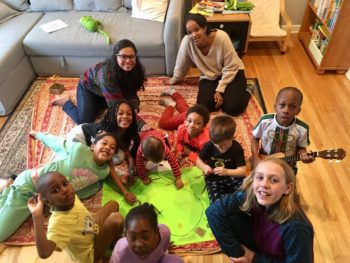Learning to work with families in the Overbrook neighbourhood
In the Overbrook neighbourhood in Ottawa, Ont., a family’s efforts over the course of a few cycles “significantly widened the embrace” of community-building activities “to many nearby households.”[1]
A children’s class learns the prayer “I am, O my God, but a tiny seed…” using actions. Photo: Samuel Benoit.
In Overbrook, a neighbourhood in Ottawa, Ont., a couple with young children has been holding and supporting children’s classes for several years. After studying paragraph 12 of the Universal House of Justice’s 30 December 2021 message,[2] they developed a strong desire to learn about working with families in their neighbourhood. News of the convocation of a series of global conferences brought more urgency to this endeavour. In thinking about the relationships they had at the time, which mostly involved conversations at doorsteps, the couple realized that they would need to deepen these friendships as well as the level of understanding families had about efforts underway in the neighbourhood before inviting them to the conference. They set a goal of having more profound conversations with all the families who were connected to the children’s class and, unbeknownst to them, embarked on a process that would lead to a transformation in less than three cycles.
They made a calendar, marking out days to invite families one at a time to their home for dinner. In addition to fellowship during these visits, they discussed the children’s classes and their purpose and asked the children to share what they were learning. They analyzed the forces in their neighbourhood, positive and negative, and spoke about how engaging in the community-building process fosters a long-term vision for raising their children with a rich and vibrant pattern of community life. When speaking with some of the families, who are newcomers to Canada, they acknowledged feelings of isolation. There was a realization that together they can build the type of strong community bonds they crave and be there for each other as friends and fellow parents.

A Grade 1 children’s class in the Overbrook neighbourhood engages in a craft activity. Photo: Samuel Benoit.
This process strengthened bonds of friendship and fostered a shared understanding among the families. The couple’s confidence and capacity to describe the efforts of the Bahá’í community grew with each visit. By the time they had had eight such dinners with families connected to the children’s classes, they had established a systematic pattern of seeking out both new and existing families they were connected to, having similar conversations about this vision for community life, and inviting them over to their home. Invitations to their home are offered as soon as they meet a new family, and when they visit, they say prayers, eat together, and sometimes cook together. This has become a natural pattern of the life of the family with constant, almost daily, visits and conversations with neighbours.
As understanding deepened among more and more families, a pattern of gatherings began to emerge with almost monthly community gatherings taking place in the couple’s backyard with the support of the neighbourhood team. The first family gathering took place during Ridván with around 50 individuals participating and has grown to include about 70 children, youth, and adults. These family gatherings include lots of food, singing and fellowship. The children say prayers, the junior youth talk about the service projects they are engaged in, and some of the mothers who are now involved in a study circle share what they are learning. Information about the number of core activities is presented on a flip chart with some discussion about widening the circle of participation. A shared sense of commitment is emerging. For the first family gathering the hosts prepared a big pot of rice and curry and taught a few steps of a cultural dance. By the next gathering other families brought big pots of their own traditional dishes and contributed their own cultural dances. Everyone contributes to all aspects of the gathering, from prayers, discussion, and planning to cleaning up and washing dishes. This spirit has also been carried into family camps, three of which have been held so far.
During a community gathering, a children’s class teacher demonstrates a cultural dance. Photo: Samuel Benoit.
Thirty families are now connected to this conversation, and the couple’s commitment to fostering a spirit of fellowship and mutual support and collaboration among neighbours has grown markedly. After a major storm this summer led to prolonged power outage, they set up a cook fire in their backyard and many families, including those whose children are not in the children’s classes, joined them in cooking food from their freezers and sharing with neighbours. From before breakfast until after dinner a constant stream of neighbours joined them in their backyard cooking, sharing meals, having elevated conversations, singing prayers, and even staying later to wash dishes.
A community gathering in the Overbrook neighbourhood in Ottawa, Ont., hosted in the backyard of a family’s home.
Other families are beginning to take more ownership. One week during the summer when all the teachers were out of town, two of the mothers gathered the children during their regular children’s class period to sing and play games. They sent photos to the teachers and told them they had taught the children’s class because the children were missing being together. One of the mothers who is participating in a study circle has become a dedicated children’s class teacher and regularly attends reflection and planning spaces. When a need arose for a space for the older children’s class group, one family volunteered their home. This family is now hosting a Grade 2 class in which their child is engaged in deep conversations about prayer and the Covenant.
[1] Paragraph 12 can be reviewed at the following link: www.bahai.org/r/758524487.
[2] From the Universal House of Justice to the Conference of the Continental Boards of Counsellors, 30 December 2021.








